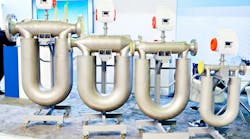Due to the growing gap between Venezuela’s declining domestic output and its expanding contractual obligations to international customers, Venezuela’s government made a $2 billion deal with Russia to start buying 100,000 barrels of crude oil per day from Russia until the end of the year, according to a report by Industrial Info Resources (www.industrialinfo.com).
Industrial Info Resources says Venezuela is facing a shortfall in its own production mainly due to poor technical management, which was demonstrated in the explosion at its Amuay Refinery in March and a complete shutdown at the Cardon Refinery on April 14. These two incidents, notes Industrial Info Resources, occurred within the Paraguana Complex in northwest Venezuela and brought about a large decrease in the international supply, affecting U.S. gasoline prices in particular. Moreover, Industrial Info Resources says such incidents put the country in risk of defaulting on contracts with clients and third parties, risking possible fines.
PDVSA (Petroleos de Venezuela SA), Venezuela’s state-owned oil company, recently announced a plan to turn Venezuela into the country with the most crude oil reserves in the world. However, Industrial Info Resources believes the company must first improve the technology at its existing plants and properly train its personnel to avoid further setbacks like the ones that occurred at the Amuay and Cardon refineries. On a positive note, Industrial Info Resources says PDVSA’s decision to buy oil from Russia shows the company is committed to meeting its customer’s needs.

